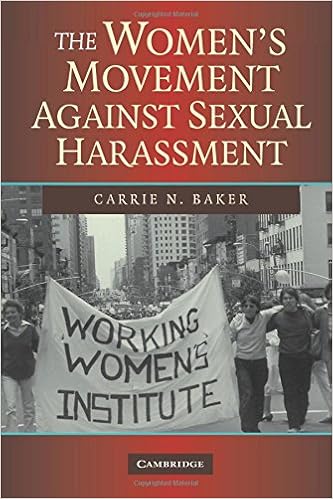Sexual Harassment in the Airline Industry: Podcast
Sexism Takes Flight, Sexting History
In the 1960s, the airline industry ramped up its sexualization of stewardesses in order to increase revenues. Decades before the #MeToo movement, flight attendants navigated a workplace in which their employers required them to stay thin, remain unmarried, and squeeze into revealing clothing every day. In the early 1970s, flight attendants organized one of the first campaigns against workplace sexual harassment, assault, and sexual discrimination.
A History of the Women’s Movement Against Sexual Harassment
Carrie N. Baker, The Women’s Movement Against Sexual Harassment (Cambridge University Press, 2007).
The Women’s Movement Against Sexual Harassment examines how a diverse grassroots social movement created public policy on sexual harassment in the 1970s and 1980s. The collaboration of women from varying racial, economic, and geographic backgrounds strengthened the movement by representing the perspectives and activism of a broad range of women. Based on interviews and voluminous original research, this book is the first to show how the movement against sexual harassment fundamentally changed American life in ways that continue to advance women’s opportunities today.

Race, Class, and Sexual Harassment in the 1970s
The Emergence of Organized Feminist Resistance to Sexual Harassment in the United States in the 1970s
The first organized resistance to sexual harassment grew out of the women’s movement, emerging at the intersection of activism against employment discrimination and feminist opposition to violence against women. The issue of sexual harassment brought together women’s workplace concerns with resistance to male sexual aggression. In the mid-1970s two organizations formed to focus primarily on sexual harassment—Working Women United in Ithaca, New York, and the Alliance Against Sexual Coercion in Cambridge, Massachusetts. Based on archival materials and interviews, this article documents the early movement against sexual harassment, focusing particularly on the feminist activists who founded these organizations who they were and how they shaped the movement against sexual harassment. These women made significant contributions to the public understanding of sexual harassment and the development of legal prohibitions against it.
Alianza Nacional De Campesinas
Alianza Nacional De Campesinas (National Alliance of Farmworker Women) has a mission to unify the struggle to promote farm worker women’s leadership in a national movement to create a broader visibility and advocate for changes that ensure their human rights.
Their Bandana Project is a public awareness campaign aimed at addressing the issue of workplace sexual violence against migrant farmworker women in the United States. White bandanas are decorated and displayed as a symbol of the sexual exploitation of farmworker women because farmworker women have said that they use their clothes, including bandanas, to protect them from sexual harassment and assault in the workplace.
Campesinas Rising is led by Alianza Nacional de Campesinas, the first national farmworker women organization that fights for campesinas’ human rights. Campesinas Rising will raise awareness about and work towards eliminating violence faced by campesina women and girls, in the United States and globally.
Sources:
- A Radio Model: A Community Strategy to Address the Problems and needs of the Mexican American Women Farmworkers, By Maria Elena Trevino
- Injustice on Our Plates, Southern Poverty Law Center
- Cultivating Fear, Human Rights Watch
- Rape in the Fields, Frontline
- Working in Fear: Sexual Violence Against Farmworker Women literature review, Oxfam America
Immigrant Women Workers
Bernice Yeung’s In A Day’s Work: The Fight to End Sexual Violence Against American’s Most Vulnerable Workers exposes the underbelly of economies filled with employers who take advantage of immigrant women’s need to earn a basic living. When these women find the courage to speak up, Yeung reveals, they are too often met by apathetic bosses and underresourced government agencies. But In a Day’s Work also tells a story of resistance, introducing a group of courageous allies who challenge dangerous and discriminatory workplace conditions alongside aggrieved workers—and win. Moving and inspiring, this book will change our understanding of the lives of immigrant women.

The Invisible War
The Invisible War, directed by Kirby Dick and Amy Ziering, is the 2014 Emmy Award-winning Best Documentary about sexual harassment and assault in the military.

